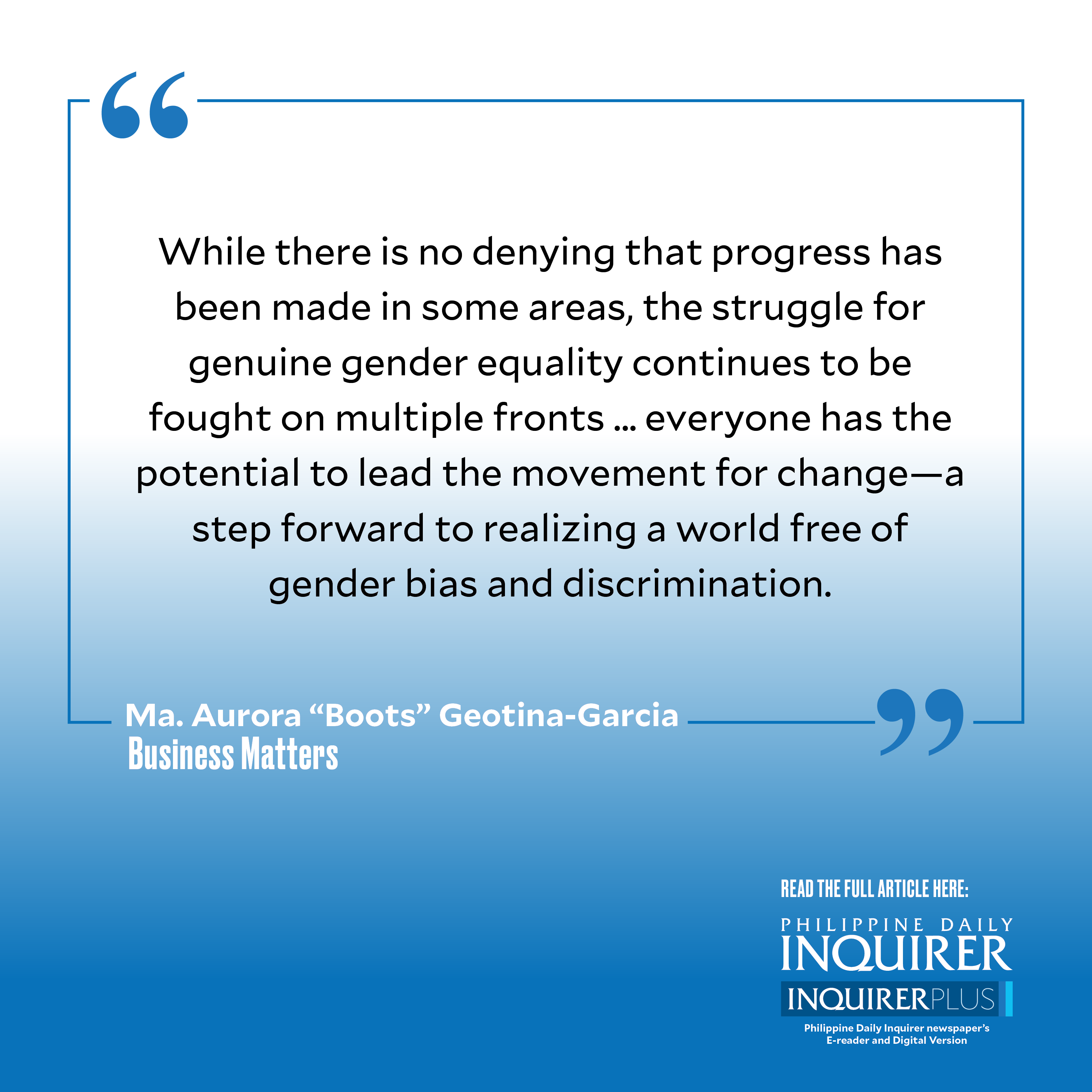The unfinished business of gender equality

Women and girls represent half of the global population and therefore, half of the world’s potential. Gender equality, besides being a fundamental right, is essential to achieve peaceful societies and inclusive development. The United Nations (UN), however, warns that “There is still a long way to go to achieve full equality of rights and opportunities between men and women.”
This statement inspired me to share a little bit about my own experience in the workplace and the lessons I learned throughout the years of my professional life where gender equality remains to be a challenge. Admittedly, I was privileged enough to be treated fairly and be mentored by the best and the brightest in the professional services and accounting industry. The work environment back then was different from what we have now, but the challenges that women continue to face were not any easier.
Article continues after this advertisementMany would ask me, “Why did you get into the gender equality and women empowerment space?” It is because I believe that privilege comes with an obligation to help others enjoy the same opportunity that was made available to me.
Everyone is “unconsciously” biased. While there is no denying that progress has been made in some areas, the struggle for genuine gender equality continues to be fought on multiple fronts. The World Economic Forum’s 2023 Global Gender Gap Report noted that the Philippines remains to be the most gender-equal country in Asia—ranking 16th among 146 countries.
Nonetheless, there has been no improvement in biases against women within the last decade. Citing the 2023 Gender Social Norms Index of the UN Development Programme, the report revealed that nine out of 10 women and men still hold biases against women. Sadly, even women share the same opinion. This translates to at least half of the population believing that men are better leaders and managers than women in the political and economic spheres. The persistence of gender bias and social norms prevent people, especially women, from reaching their fullest economic potential.
Article continues after this advertisementEfforts have been made to conduct evidence-based research studies aimed at analyzing the current state of gender diversity in Philippine corporations and how gender norms affect economic productivity. Since 2018, the partnership between the Philippine Women’s Economic Network, through the Philippine Business Coalition for Women Empowerment, and the Makati Business Club has produced two reports that seek to identify opportunities for the private sector to address the “leaky pipeline,” shift mindsets, and offer interventions to best address existing and potential issues.
Launched in 2019, the “Women in the Philippine C-Suite” study found that women generally tend to step back during their child-rearing life phase, whereas men are expected to step up to increase their financial support for the family.
Furthermore, the recently launched study entitled, “Exploring the Role of Women in Philippine Workplaces,” reveals a similar finding—that most C-level executives think men and women have similar drive and ambition, but women are held back by caring roles. Caring responsibilities tend to be seen as generally having a negative impact on women’s careers. Such an issue has been identified as one of the biggest blocks and therefore must be addressed by the C-level executives themselves.
Everyone has a role to play. Other studies have provided practical recommendations on how to promote awareness of gender diversity, equity, and inclusion. These studies present several initiatives that can serve as a good baseline for private sector firms. These include increasing access and equal provision of family-friendly policies, strengthening economic incentives for women to remain in the workplace, and reducing barriers to economic participation, especially for expectant mothers and solo parents.
As the late Justice Ruth Bader Ginsburg once said, “Fight for the things that you care about but do it in a way that will lead others to join you.” Ultimately, it is about changing societal mindsets and behaviors. I believe that everyone has the potential to lead the movement for change—a step forward to realizing a world free of gender bias and discrimination. Indeed, gender equality remains an unfinished business.
—————-
Ma. Aurora “Boots” Geotina-Garcia is the founding chair and president of the Philippine Women’s Economic Network, chair of the Governing Council of the Philippine Business Coalition for Women Empowerment, and co-convenor of the Champions of Change Coalition Philippines.
—————-
Business Matters is a project of the Makati Business Club (makatibusinessclub@mbc.com.ph).
















